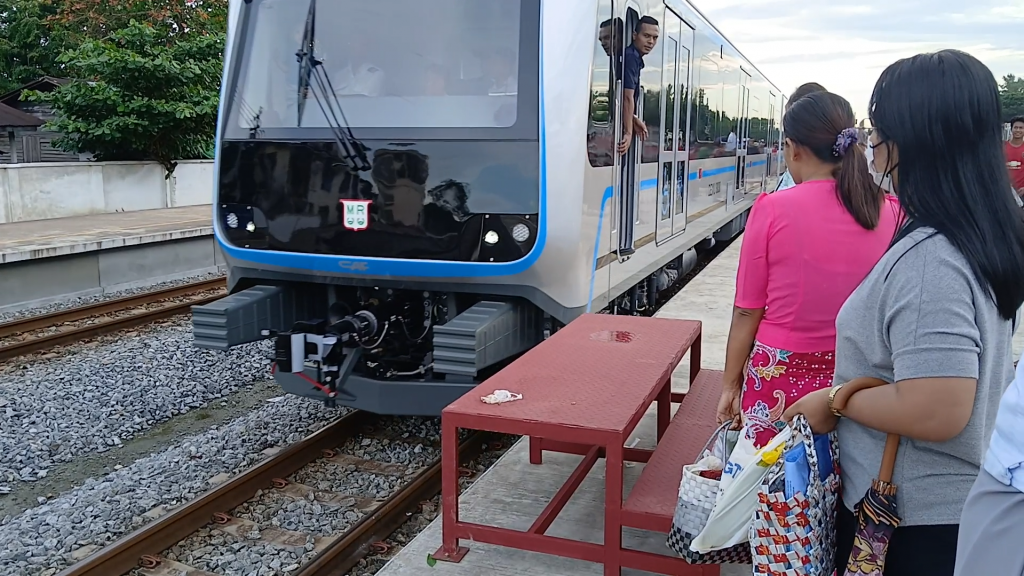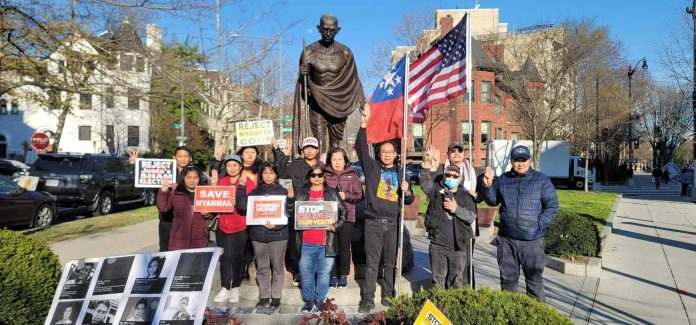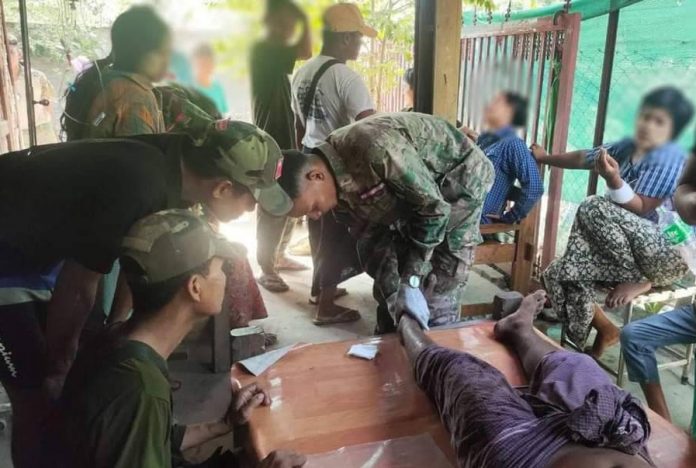Guest contributor
Moe Gyo
The oppression and colonization of women arises from a historic patriarchy of Myanmar which exercises its controlling power and dominance through various societal institutions:
- Union/sub-union governments
- Tatmadaw (Burma Army)
- Ethnic groups/culture
- Religion
- Family (Father/husband/brother/son)
From this perspective, the Spring Revolution can be considered as merely a continuation of the ongoing conflicts between the dominant males of this Myanmar patriarchy for control over territories, populations, and the social, economic, and political lives of all Myanmar people. The fighting is not about democracy or federalism, but the domination of one patriarchal group over another.
Gender equality poses a threat to these patriarchal combatants through male perceptions that it will weaken them in their competition and quest for dominance. Therefore, various patriarchies in Myanmar give women empty promises and rhetoric about gender equality, yet hope that their patriarchal competitors will embrace gender equality to allegedly weaken their resolve and capabilities in this competition for dominance.
The male-dominated National Unity Government (NUG) and Bamar political elite speak about democracy. Yet, there can be no democracy when women, who are half of the population, cannot participate equally in it. The male-dominated ethnic Peoples’ Defense Forces (PDFs) and Ethnic Armed Organizations (EAOs) proclaim that they seek federalism which provides for ethnic equality in all sectors. However, there can be no ethnic equality when this same half of the population cannot participate equally in this power sharing. Furthermore, ethnic equality does not mean gender equality if it is just another form of patriarchy by ethnic men.
During the Civil Disobedience Movement (CDM), women spontaneously rose to the occasion and placed their lives, next to the men, on the frontlines in the streets of the major towns and cities of the country. Many women stepped forward to assume impromptu leadership roles. These brave women did not ask the men for permission to participate. Yet, women in the revolutionary groups, unlike their CDM counterparts, can only participate in the roles determined by men and of a general stereotypical nature. Therefore, unlike the CDM, women continue to remain in the background within the revolutionary groups.
While women attend military training and otherwise work within the revolutionary groups, they have almost entirely been assigned to traditional gender-stereotypical roles, such as cooking, sewing/repairing uniforms, cleaning (e.g., captured weapons), filling ammunition clips, preparing improvised explosive devices, etc. Moreover, women are sexually exploited by the revolutionary groups for fundraising and the recruitment of men through staged and posed videos and photographs of them on social media with uniforms and weapons giving the false impression that they are fighting on the frontlines with men.
Yet, women must also assume the responsibility for this exploitation and “housewifization” of themselves by the revolutionary groups. They have been conditioned to do so by the patriarchal national-state, culture, religion, and family norms, and seem unable or unwilling to break through this conditioning to achieve true liberation and gender equality. The place of women, in the Spring Revolution, has been and continues to be determined by men. The end result will still be a patriarchy. Unfortunately, women are fighting, in the revolution, to maintain a patriarchal structure, not a structure where women are treated as human beings the same as men and as equal to men.
Patriarchal oppression
To correctly understand “housewifization” in the revolutionary groups, it is necessary to know how patriarchy and gender as structural power relationships arose in the past and are reproduced in the present. Patriarchy, “rule of the father”, is a system in which men exercise power and domination over not only their own wives and children, but also women, in general, through controlling societies’ cultural, religious, social, economic, and political institutions and norms.
This is the patriarchal paradigm of the dominant male and submissive woman with its exploitation of women as daughters, wives, sisters, and mothers from ancient to the present times. The origin of patriarchy and the “housewifization” of women began with the monogamous family and is the oldest form of human enslavement, colonization, and exploitation. Men took control over women as a means of production for free labor and as a child-bearing/raising machine to produce male descendants.
A woman’s labor in the house is considered a natural resource which is freely available to men like air and water, yet is totally devalued. Women were, and in certain parts of the world today are still, tradable commodities to be exploited with other inputs of labor in a capitalist system. This process of “housewifization” has resulted in the progression of men’s ownership of women first to her father and later then to her husband. Thus, they are subjected to continuous exploitation of their labor and childbearing and rearing capacities. Consequently, women became the most oppressed class in history even more so than the worker.
Women’s empowerment comes through the resolve to “kill the dominant man”. To “kill the dominant man” is a metaphor, coined by the Kurdish revolutionary leader Abdullah Ocalan, to “kill” and otherwise eradicate the one-sided patriarchal domination and oppression of women by the nation-state, society, religion, and family to achieve a real change in society, especially in regard to gender equality. Thus, the aim must be to change the whole patriarchal system, not to affect a change within the patriarchal system. It is the patriarchal system itself which is the problem.
Militarization of women to eliminate ‘housewifization’ and patriarchy
The field of war can be regarded as representing the ultimate masculine dominance and is a competition of masculinized dominance in which nation-states, as gendered actors in a gendered system, are out to dominate one another rather than to peacefully co-exist together. War depends upon gendered images of combatants which are designations traditionally considered to belong to men and thus masculinized. As such, the image of war is strongly identified with patriarchy, masculinity, and the man ‐ a space reserved solely for men and where the woman is not welcome.
Yet, war opens a window of opportunity for women where their participation provides a unique chance to increase their political agency and improve gender equality in society. Furthermore, it can accelerate the process of transformation for women and allow a breaking down of gendered perceptions through women taking up arms and being perceived as taking on the gender characteristics generally associated with masculinity. However, at the same time, it challenges the patriarchal social order within which these groups operate.
Women in combatant units can transgress the idea of the invisible women in war to the existence of the woman as visible in war by entering traditional hyper-masculine spaces such as the military and defying the dominant gender norms. Militarization can be considered as an “instrument of equality” and the only path possible to liberate their gender and “becoming a power” in societies where oppressive patriarchal structures dominate.
For a woman to be accepted by the revolutionary groups as possessing the values and qualities of a revolutionary fighter, they must demonstrate their ability to perform the male gender, which, in war, is strongly associated with the ability to be violent, kill, and courageous.
However, this implies that the male gender is regarded as superior to the female gender and that only the male gender belongs in war as it is the only gender believed to be capable of such violence, killing, and courage. Thus, where that which is associated with masculinity has been and continued to be socially constructed as of superior value to that associated with femininity.
Masculinized nation-states are hostile to the idea of a woman fighter as this would imply that the woman has released herself from the shackles of traditional gender norms and taken on the stereotypical gender norms strongly associated with men and masculinity. Therefore, women would pose a threat to men and the social order when women place their lives on the frontline through fighting in the revolutionary struggle.
In the revolutions in history, women take part at their beginning. Yet, over time their role diminishes and they become excluded and marginalized, and no better off than before. Once the revolution is over, they are typically relegated back to their traditional or stereotypical roles as women.
In many countries during World War Two, women held stereotypical male jobs, but lost them when men returned to war. They were returned, by men, to their gender stereotypical roles as housewives to men. Thus, their position within a war or revolutionary struggle has been repeatedly ignored or subsumed when reintegrated back into normal society.
‘Kill the dominant male’ in Myanmar’s revolution
The revolutionary groups in Myanmar can be considered as “patriarchal families” with men as the “husbands” and the women as the “housewives”. Women in the revolutionary groups have allowed themselves to assume this “housewifization” through their free choice as they have been conditioned by men in the family, culture (especially ethnic culture) religion, politics, and other aspects of society to do throughout their lives.
While the revolutionary groups require a constant supply of fighters, there are hundreds, if not thousands, of women who are readily available for training and willing to fight as equals on the frontlines for the defeat of the Burma Army. Despite this, the male leaders of the revolutionary groups have selected women, with very few exceptions, to be relegated to stereotypical roles as “housewives” within the revolutionary groups.
However, some male leaders in the revolutionary groups have temporarily “promoted” a few women, for the duration of the revolution, from “housewifization” to become “honorary fighting men” as drone operators, snipers, or medics. Yet, these “honorary fighting men” positions very rarely extend to situations where women are able to place their lives at risk equally with men by being positioned directly on the frontlines alongside “real fighting men”.
Any leadership roles, held by women within the revolutionary groups, are solely over women, not men only, or men and women. Gender-based divisions of labor within the revolutionary groups do not permit women to fully engage in the struggle through sharing the same risk of death and war trauma on the frontlines along with the men. Thus, by not assuming this risk, women are not considered to be equal to men in the revolutionary groups.
Women, with weapons on the frontlines fighting alongside men, demonstrate that they too are willing to be killed or maimed for a greater cause as this affects both men and women alike. Risking their lives by using weapons, women create gender equality in the revolutionary groups which can translate into gender equality in the society at large upon the success of the revolution instead of a return to “housewifization”.
Should the men, in the revolutionary groups, not permit women to be integrated into frontline fighting units to include command roles over men in gender-integrated military units, then revolutionary women must form their own women-led combat columns to fight on the frontlines. In either instance, women must enter the most masculine role of men – war – and begin to “kill the dominant male” – the one-sided patriarchal domination and oppression of women in Myanmar society through the equalization of lives at risk for the revolution.
The Spring Revolution is not only about defeating the Tatmadaw and achieving ethnic equality, but also to establish gender equality. To secure this fundamental human right for women, the Spring Revolution must destroy the patriarchal system beginning with the total elimination of housewifization and the implementation of gender equality in the revolutionary groups.
Should the Spring Revolution continue to perpetuate institutionalized patterns and norms of patriarchy over women and assignments of stereotypical roles for women, then when the Spring Revolution is won, it can be expected that women will return to their traditional roles within a patriarchal society, not new roles which indicate genuine gender equality.
Moreover, women must be acutely conscious of a pattern of postponement and firmly refuse to delay or defer gender equity until some future “more appropriate” time once the revolution is over. The time is now for gender equality while this unique historic opportunity presents itself and not at some indefinable future time determined by men and which can be expected, according to past patterns, to never occur.
Thus, in the end, nothing can be expected to be changed for women should they fail to reorient their patriarchal-conditioned submissive mind toward final liberation and continue to accept the stereotypical roles and norms set for them by the men of the revolutionary groups.
The Spring Revolution offers the opportunity for revolutionary women to break free from the “housewifization” imposed upon them in the revolutionary groups and place their lives on the frontlines for the success of the revolution, and achieving gender equality and liberation from patriarchy. The patriarchal chains of “housewifization” in the revolutionary groups must be destroyed, through “killing the dominant male” to bring about true gender equality as a basis for sustainable peace in Myanmar. Women must stop trying to change the patriarchal system from within. It has not worked for thousands of years, so it will not work now.
A revolution that does not alter the status of women is no revolution at all. Real change in Myanmar and ethnic societies can be only achieved through a reconstruction of the whole society to realize social, economic, and political equality for all regardless of gender.
Moe Gyo is a political consultant and strategist working on the Thailand-Myanmar border. DVB publishes a diversity of opinions that does not reflect DVB editorial policy. We’d like to hear what you think about this or any of our stories: [email protected]o












